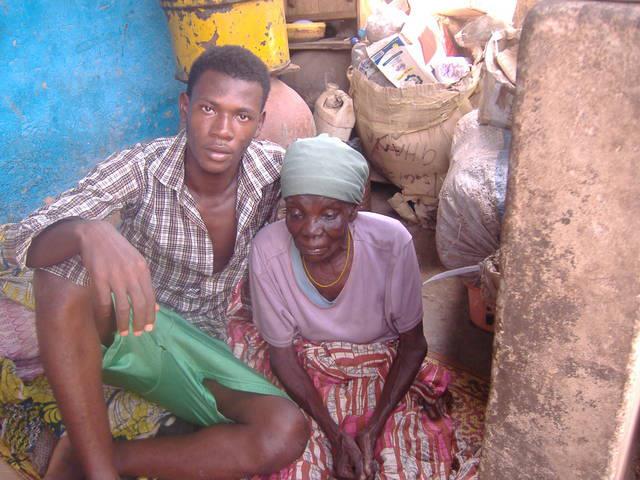
"The rich swell up with pride, the poor from hunger." -- Sholom Aleichem
There's a boy in Africa who calls me dad. And I wonder if he knows about the Olympics or the closing ceremonies. His name is Izdeen and he lives with his 94-year-4old grandmother and teenaged sister in a thatched roof, dirt floor house in a little village in central Ghana. I thought about Izdeen as the music rose and the lights flashed and the billions of dollars in stadiums and parks and venues sparkled in the closing ceremonies.
And I wondered if he could imagine the money. Or the food; especially the food.
He found us on the Internet. And I was skeptical. I thought he was an online version of a Nigerian trying to give me a big inheritance if I'd just send a down payment to free the funds. Instead, he turned out to be a handsome kid in his late teens whose mother, father, and brother had been killed in an accident. He had made his way to an Internet café in a distant town and figured out how to get online and began a conversation. He told us his story and said he and his sister and grandmother needed help.
We sent money for food when his teacher told us that Izdeen's family had entered into starvation. When he claimed the wired money, Izdeen sent a note to say that he was excited when he saw a bag of rice on a dock that said, "Texas" on the label. The three of them ate well for a month on $50 dollars. When I asked what he did before the money, he said, "Dad, I go to the chop houses and so does my sister. We go out back when they throw out what isn't used. Sometimes there are fights for the scraps."

If Izdeen could have seen the streets of London in the midst of our quadrennial celebration of youth and sport and culture, he would probably collapse in awe. Even with limited Internet access, he can hardly know such a world exists where people are able to eat and play and exult in the sheer joy of just being. Do we owe him and the rest of the hungry and ill in the developing world an explanation of how we can come together in peace to create such a costly spectacle but we cannot work in unity to end hunger and suffering? Is it even fair to ask such a question?
A little food can set a young man's mind to thinking. He asked for money to attend a school and a bike to make the daily 20-mile ride and then he asked for the same thing for his sister. "Dad, we are so proud," he said. "And grandmother is so proud, too, and we are dancing and singing all night to also have food." The school will teach him he lives on a continent where uncountable millions are even hungrier than his family and they are dying of starvation and AIDS and the world is making only modest efforts to assist.
And then he will also learn about the Olympics. Izdeen will see the joyous faces engaged in sport in cathedrals that cost hundreds of millions of dollars and he will see the dancing and the giant airplanes and the glamorous clothes and hotels with soft beds and people who bring food right to your door. This will make him ponder the disparities of life and he will ask the questions that have been contemplated without answers through the ages. But they are more sharp-edged now in a world of great abundance and technology; we try to understand how there can be such wanting and deprivation.
The world needs the Olympics; we need to see Christians and Muslims and Palestinians and Israelis treating each other as athletes and friends. We need to know we have it within us to live a better way, to be better people, to be happy about youth and the future, to know that striving for excellence is worthy and elevates the human condition. But aren't we obligated to ask ourselves if we've gone too far with the billions for the games and the structures and the hype? Is it time for some restraint or more exuberance and spending?
And what do we say to Izdeen when he gets hungry and there is no food?
Also at: http://www.moorethink.com
